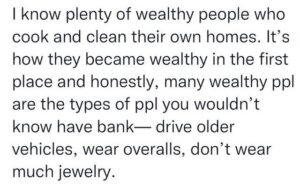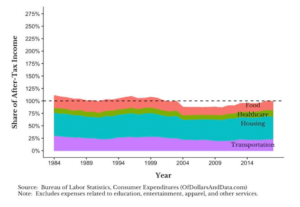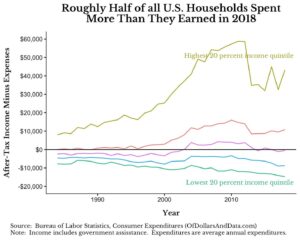Let’s talk about spending. As is common, my desire to share a few thoughts on spending comes from stuff I’ve recently seen on the internet. Here’s a tweet that caught my attention:

I see tweets like this on Twitter all the time and have read quite a few published personal finance articles that echo the same sentiment. The part of this tweet I want to discuss is the “it’s how they became wealthy in the first place” proclamation.
Another popular example of this is when people say, “Warren Buffett has lived in the same home in Omaha for 40 years and eats McDonald’s every day. That’s why he’s rich.” Yet, Buffett also has a private jet. And we all know his fortune wasn’t derived from his McDonald’s habit, but rather his investing prowess.
The point is when people say things like, “That’s why they’re wealthy!” it can deceive people into thinking that spending money is not only a sign of immorality or laziness but that someone’s inability to be sufficiently frugal must be the reason why they’re not wealthy.
The reality is a millionaire cleaning, or not cleaning, their home has very little impact on why they’re a millionaire. The most likely reason they’re a millionaire is they earned a high income, saved consistently, and invested in income-producing assets.
One of the biggest myths in personal finance is that you can be rich if you just cut your spending.

According to data from the Bureau of Labor Statistics, the primary reason people don’t save for retirement and build wealth isn’t that they spend extravagantly, but because they don’t make enough money. Low income, not bad spending habits, is the bigger issue.
The bottom 40% of U.S. households spend almost all of their income on basic necessities:

If we include non-essential expenditures like education, entertainment, clothing, etc., roughly half of all households spent more than they earned in 2018:

There’s a baseline amount of costs in order to live a decent life that you can’t get around — you can only reduce your expenses to a certain extent.
So, if you’re looking for a secret to building wealth, prioritize increasing your income. Invest in yourself to boost your earning potential. The more you make the more you have to save and invest. Unless you have a spending problem, the best way to increase your savings isn’t by canceling your Netflix subscription or buying less coffee, it’s by increasing your income.
Here’s one more tweet I wanted to bring up while on the topic of spending:


I have to hand it to him—the title is catchy and made me click on the thread. According to this Twitter thread, some of the dumbest spending decisions people make are eating out, buying bottled water, buying energy drinks, upgrading your phone frequently, partying, and buying video games.
This idea of “dumb” purchases doesn’t really make sense to me. I’m sure there are people out there who think that I spend way too much money on golf—and they might be right. But I really like to golf. If I don’t spend my money on things I enjoy, then what’s the point?

The only dumb purchases are the ones that don’t bring you joy and fulfillment.
The key to smart spending habits is to align your spending with what’s most important to you. Studies have found that value-aligned spending was a stronger indicator of happiness than an individual’s total income or total spending.
This may seem obvious, but I don’t think it’s commonly practiced. A powerful exercise is to actually sit down and make a list of your priorities, values, and favorite activities. Then compare that list with your purchases. You might be surprised at how many dollars you’re spending on things in the middle and bottom of your list.
For example, you may feel guilty about going out to lunch with friends and coworkers more frequently than you feel is appropriate for your budget. However, after sitting down and making a list of what is most important to you, you might find that you really enjoy those lunches — they bring a lot of joy to your life. So cutting your movie-going budget, a lesser priority, and allocating more money to your lunches might be the better choice.
Spending money on something that makes a positive impact on your life can very much be classified as a smart financial decision and good financial planning in my book.
Thanks for reading!

